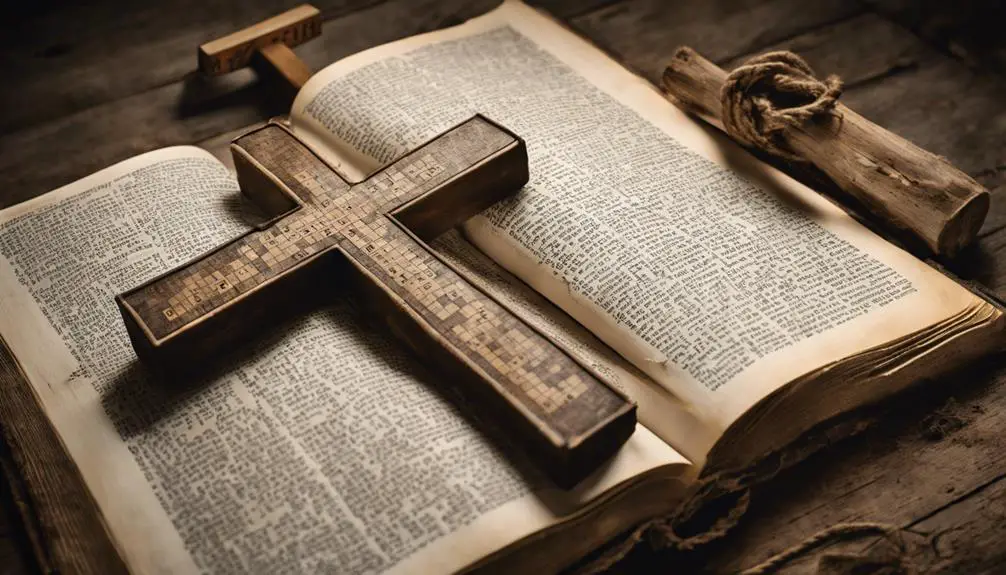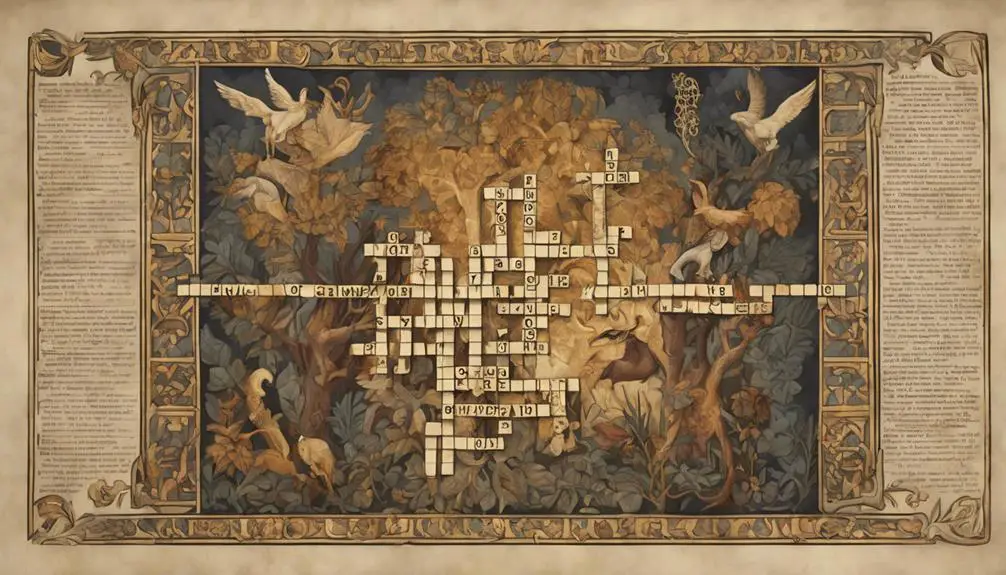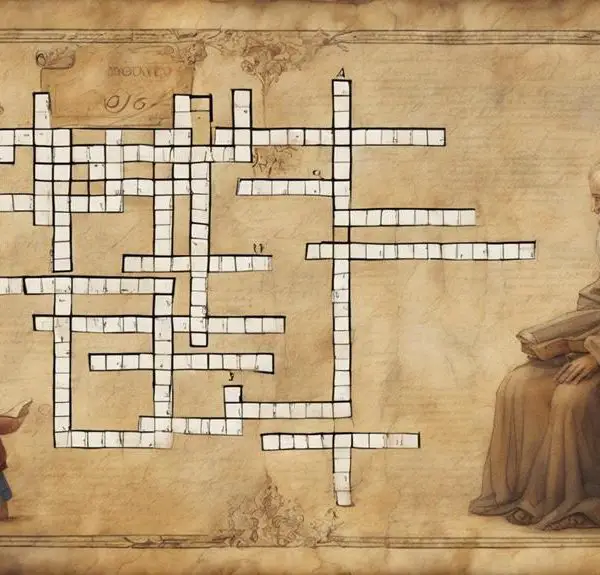Dive into biblical history with the 'Aaron's Son in the Bible' crossword clue, a gateway to an intricate, ancient narrative.

Aaron's Son in the Bible Crossword Clue
As you trace the parchment-like lines of a crossword puzzle, your eyes catch on a particular clue: Aaron's son in the Bible.
You're not just solving a crossword, you're embarking on a journey through biblical history, unraveling the threads of a complex, ancient narrative.
The answer is not only a name, but a figure rich in history and religious significance. Who was he? What role did he play? Why is his story important?
As you ponder these questions, you realize there's a depth to this puzzle that you hadn't previously considered.
Key Takeaways
- Aaron's sons in the Bible are Nadab, Abihu, Eleazar, and Ithamar, offering multiple possible answers to the crossword clue.
- Eleazar and Ithamar played significant roles, succeeding Aaron as High Priest and overseeing the Levites respectively.
- Biblical knowledge, particularly about Aaron's lineage, can be helpful in solving such crossword clues.
- Utilizing crossword dictionaries and online tools can aid in confirming the correct answer to the clue 'Aaron's Son in the Bible'.
Understanding Aaron's Biblical Role

To grasp the significance of Aaron's role in the Bible, it's essential to delve deeply into his life's narrative as depicted in the Old Testament. Aaron's Priesthood, a vital aspect of his biblical character, provides a rich context for understanding his significance in the religious framework.
Aaron, brother of Moses, hails from the Levitical lineage, a priestly class within the Israelites. He's not merely a supporting character; his role is central to the biblical narrative. Aaron's Priesthood signifies the establishment of the Levitical order, marking a pivotal point in the evolution of Israelite religion.
Aaron's duties as a priest were manifold. He was to offer sacrifices, maintain the sanctity of the Tabernacle, and act as a mediator between God and the Israelites. These responsibilities reflect the immense trust God placed in Aaron, further confirming his importance in the biblical narrative.
Analyzing Aaron's Priesthood and Levitical lineage, it's clear that his role was paramount. His life and actions established a religious foundation for future generations of Israelites. His story is a testament to faith, duty, and divine calling, underscoring the critical importance of his role in the Bible. Thus, a comprehensive understanding of Aaron is fundamental to appreciating the Old Testament's rich tapestry.
Exploring Aaron's Offspring

Delving into the lineage of Aaron, you'll encounter a significant number of influential figures, beginning with his four sons: Nadab, Abihu, Eleazar, and Ithamar, who played pivotal roles in the continuation of the Levitical Priesthood.
Despite their important roles, the Priestly lineage controversies often revolve around these four sons. Nadab and Abihu, the elder two, faced a tragic end due to their disobedience, stripping them of their priestly rights. This occurrence further fueled the debates surrounding the legitimacy and continuation of the Priestly lineage.
Given their Tabernacle responsibilities, Eleazar and Ithamar, the remaining sons, were quite significant. Eleazar succeeded Aaron as High Priest, while Ithamar was responsible for the oversight of the Levites.
To give you a clearer picture, let's examine a brief comparison of Aaron's sons:
Son |
Role |
Controversy |
|---|---|---|
Nadab |
Initial Priest |
Disobedience led to death |
Abihu |
Initial Priest |
Disobedience led to death |
Eleazar |
High Priest after Aaron |
None |
Ithamar |
Oversight of Levites |
None |
This analysis allows you to understand the complexities and controversies within Aaron's lineage, highlighting the importance of obedience and righteousness in their priestly duties.
Intriguing Crossword Clues Explained

Shifting our focus from biblical lineage to the realm of crosswords, let's decipher some intriguing clues that often leave puzzle enthusiasts scratching their heads. Understanding clue deciphering techniques is key to mastering these word puzzles.
Let's start with anagrams, where the clue is scrambled to form a different word or phrase. 'Rants on' might lead you to 'Astron', for example. Then there's charades, where the clue is broken into parts that build up the answer. Think of 'under' (below) + 'rate' (speed) leading to 'underrate'.
Hidden words are also common, where the answer is embedded within the clue itself. 'I heard a raven croak' hides the word 'aven', for instance.
Understanding the crossword puzzle history can also aid in clue solving. Pioneering in 1913, Arthur Wynne's first crossword was a diamond-shaped puzzle with no black squares. Since then, the design and complexity have evolved, with constructors incorporating intricate wordplay and cultural references.
Crossword Puzzles and Biblical References

In your journey through the world of crossword puzzles, you'll often come across clues steeped in biblical references, providing an enriching blend of language, culture, and religion. These puzzles, part of the Crossword Creation Process, leverage the deep well of Biblical Word Origins to create complex and rewarding challenges.
The Crossword Creation Process requires a deep understanding of biblical references. Creators often use Biblical Word Origins, drawing from the rich and varied vocabulary found in translations of the Bible. This can range from names and places to more obscure ceremonial practices.
Here's a brief table summarizing common categories of biblical references used in crosswords:
Category |
Example |
Explanation |
|---|---|---|
Person |
Aaron |
A biblical figure, often used for clues involving names. |
Place |
Eden |
Locations from the Bible are common in crosswords. |
Practice |
Sacrament |
Religious practices or items can provide diverse clues. |
Strategies to Solve Biblical Crosswords

When you tackle biblical crosswords, having a strategy can make all the difference. Acquainting yourself with crossword techniques and developing an extensive biblical vocabulary can significantly enhance your ability to solve these puzzles.
Start by brushing up on your biblical knowledge. Read different versions of the Bible, and pay attention to the names, places, and events. Regular exposure to biblical vocabulary will make you familiar with the words that often appear in these puzzles.
The use of crossword techniques is also vital. For instance, focus on the shorter words first. They can help you guess the longer words that intersect with them. Also, don't ignore the theme. In a biblical crossword, the theme is likely to be a book, character, or event from the Bible. If you know the theme, you can predict some of the answers.
Lastly, don't hesitate to use resources. Crossword dictionaries and online tools can provide you with clues or even solutions when you're stuck. Remember, the goal is to enjoy the process, not just to finish the puzzle. With these strategies, you're sure to improve your biblical crossword-solving skills.
Frequently Asked Questions
What Is the Significance of Aaron's Role in Other Religious Texts Outside of the Bible?
You'll find Aaron's influence in Islam and his role in Jewish traditions quite significant. In Islam, he's respected as a prophet and the brother of Moses.
In Jewish traditions, he's revered as the first High Priest. His peacemaking qualities are often highlighted.
Are There Any Prominent Descendants of Aaron in Modern Times?
You're asking about Aaron's influence today and modern priestly lineages. It's challenging to pinpoint specific, prominent descendants of Aaron in our times.
However, Jewish people with the last names Cohen, Kohen, or similar variants, are traditionally considered descendants of Aaron, as 'Cohen' means 'priest' in Hebrew. They still bear certain religious responsibilities in Judaism, showing Aaron's lasting impact.
Can You Provide Some Examples of Other Religious Figures Featured Prominently in Crossword Puzzles?
Certainly, in the crossword puzzle creation process, various religious figures are often used. You'll find references to figures like Noah, Moses, or Mary, due to their recognizability and short names.
Religious iconography in puzzles isn't limited to Christianity either. Figures from other faiths, such as Krishna or Buddha, also appear.
It's about creating challenges that are both engaging and familiar to a broad audience.
Do the Skills Required to Solve Biblical Crosswords Differ From Those Needed for Regular Crossword Puzzles?
You don't need different skills to solve biblical crosswords compared to regular ones. It's all about crossword puzzle skills: pattern recognition, vocabulary knowledge, and problem-solving abilities.
However, biblical crossword strategies may involve a deeper understanding of religious texts. It's not just about Aaron's son or any specific clue; it's about broadening your knowledge base.
Think of it as enhancing your crossword skills with a religious twist.
What Are Some Other Methods of Learning About Biblical Characters, Apart From Crossword Puzzles?
Apart from crosswords, you've got numerous methods to learn about biblical characters. Reading biblical texts, attending study groups, or watching biblical character portrayals in films or plays can be insightful.
You could also delve into scholarly articles for a more academic perspective. It's about finding what works best for you, as each method provides a unique learning experience, varying in detail and personal engagement.
Conclusion
In conclusion, cracking biblical crosswords like 'Aaron's son in the Bible' can be an enlightening journey. By delving into Aaron's role and lineage, you've not only solved a puzzle but also deepened your biblical knowledge.
Remember, tackling such crosswords requires patience, practice, and a good understanding of biblical narratives. Keep exploring, keep learning, and you'll find that these puzzles become more manageable and enjoyable over time.



Sign up